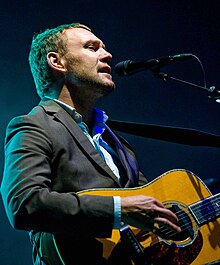David Gray (born 13
June 1968) is an English singer-songwriter from Sale, Cheshire. Gray
released his first studio album in 1993 and received worldwide attention after
the release of White Ladder six years later. It was the first
of three UK chart-toppers in six years for Gray, the latter two of which also
made the Top 17 in the US. He has been nominated for four Brit Awards – twice
for Best British Male.
Early
career
Gray was born in Sale and brought up in Altrincham,
Cheshire, before moving with his family to Wales, where he grew up in the small
coastal town of Solva in Pembrokeshire and went on to attend the
Carmarthenshire College of Art. He later moved back to
the north-west of England to attend the University of Liverpool.
Gray's first two albums A Century Ends and Flesh were
issued in 1993 and 1994 respectively and led to Gray becoming popular in
folk-rock circles, but both failed in terms of commercial sales.
In 1996 Gray released his third album, Sell, Sell,
Sell. With
his first two albums having been entirely composed of acoustic folk music, this
was his first mature exhibition and saw him use his now-trademark blend of
folk, alternative rock and electronics for the first time.[citation needed]
Despite critical acclaim, the album did not chart, but the song "Late
Night Radio" received some airplay on alternative UK radio stations.
White Ladder (1998–2002)
The re-release of Gray's fourth record album, White
Ladder, in 2000 on ATO Records, brought him commercial success and critical
attention. The album included his best-known songs: "This Year's
Love", "Babylon", "Please Forgive Me" and "Sail
Away". White Ladder was originally released on Gray's own label IHT
Records in November 1998. After its re-release, combined with the release and
success of single "Babylon", it sold 100,000 copies in Ireland alone,
making it number one for six weeks, and it remains the biggest-selling album in
Ireland. In August 2000, "Babylon" hit No. 5 in the UK Singles Chart;
it remains his biggest UK hit to date. In the United States, the
album received a boost from jam-band leader Dave Matthews, who made it the
first release by ATO Records, the record company he co-founded.
"Babylon" was also the first of three US chart entries for Gray to
date. In Ireland,
White Ladder remains his biggest-selling album.
The album was No. 1 on the UK Albums Chart, two years
and five months after its original release, spending a total of 151 weeks on
the chart. Aside from "Please Forgive Me," which charted at No. 72 on
the UK Singles Chart, all other single releases charted within the Top 20: the
re-released "Please Forgive Me" charted at #18, and "Say Hello
Wave Goodbye" and "Sail Away" peaked at #26.
The year 2001 also saw the release of two compilation
albums of Gray's early works and unreleased material, The EPs
1992-1994 and Lost Songs 95-98, both of which followed White Ladder into the
Top 20 in the UK Albums Chart.
In November 2002, Gray
released the follow-up to White Ladder, entitled A New Day at Midnight. The new
release did not receive the same critical acclaim as its predecessor, but still
went straight in at Number One, famously beating Pop Idol runner-up Gareth
Gates's debut album What My Heart Wants to Say to the summit and selling nearly
150,000 copies in its first week of release; it went on to reach platinum
status within a year, eventually being certified four times platinum overall,
and was the second-biggest selling album by a UK artist in 2002, behind Pop
Idol winner Will Young's debut album From Now On. A New Day at Midnight spawned
two further UK Top 30 hits in "The Other Side" and "Be
Mine" and a minor US hit with "Dead in the Water".

No comments:
Post a Comment